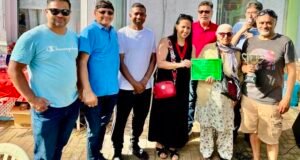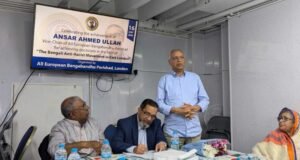Sharif Ahmed Majumder1 v. Secretary of State for the Home Department
(IA/31380/2014)
Judgment Date: 23 March 2016
We act for the appellant, Mr Sharif Ahmed Majumder, in this appeal. Mr Majumder was represented by Counsel, Mr Michael Biggs of 12 Old Square instructed by Universal Solicitors at the hearing before the Presidential Panel.
Background
BBC Television programme “Panorama’s” broadcast of 10 February 2014 exposed fraud at some English languages test centre in relation to the taking of the Test of English for International Communication (“TOEIC”). TOEIC is one of the tests administrated by Educational Testing Services (“ETS”). ETS, an USA based company is the world’s largest private non-profit educational testing and assessment organisation. The allegation in TOEIC test cases included the use of proxies to undertake speaking tests by impersonating the candidates.
Immigration Minister, James Brokenshire, in his statement to Parliament made on 24 June 2014 said that an investigation, launched after Panorama, found evidence of 29,000 “invalid” tests and 19,000 “questionable” tests (in total 46,000). On the basis of that investigation, the Home Office took the drastic actions by instigating removal proceedings against the migrants alleged to be involved in the cheating. Other actions included revoking sponsorship licences of around 60 educational institutions, and detaining and removing tens of thousands of international students and migrants who had obtained TOEIC certificate in the past.
Mr Sharif Ahmed Majumder, like thousands of other individuals, was accused by the Home Office of obtaining a TOEIC certificate by deception and relying on it to support his application for leave to remain in the United Kingdom as a student. The Home Secretary, on the basis of her allegation, cancelled his leave while he was returning from a short holiday abroad. He was detained too. His appeal against the Home Secretary’s decision, ultimately, came before the Presidential Panel comprising the President of the Upper Tribunal, The Honourable Mr Justice McCloskey. The appeal was heard as a lead appeal to test the evidence adduced by the Home Office in TOEIC in support of their allegation of deception.
Evidence
The President heard evidence in this appeal over 5 days. The Home Secretary called Ms Rebecca Collings and Mr Peter Millington, senior Home Office officials, to give oral evidence. Their statements were used by the Home Secretary in defending all of the TOEIC/ETS cases in various courts. The President also heard evidence from Dr Harrison, an expert in the field of voice recognition, Mr Richard Watson, the producer of BBC Panorama documentary, and of Mr Majumder.
Decision and findings
The President, “without hesitation”, allowed Mr Majumder’s appeal and concluded that the Home Secretary’s decision was unlawful.
The President has made these striking findings as to the Home Secretary’s general conduct and quality of her evidence (emphasis added):
- a) The Home Secretary failed to provide her communications (emails and letters) with the ETS about this issue and that this conduct “is not harmonious with elementary good litigation practice and is in breach of every litigant’s duty of candour owed to the court or tribunal” [15].
- b) The Home Secretary’s evidence “suffers from the multiple frailties and shortcomings” [90] and “its shortcomings are manifest” [63]. “The evidence adduced on behalf of the Secretary of State emerged paled and heavily weakened by the examination to which it was subjected … the Secretary of State’s evidence had paled and wilted”. “In the sporting world a verdict of no contest would have been appropriate at this juncture” [66].
- c) The evidence given by Ms Rebecca Collings and Mr Peter Millington was “the backbone” [58] of the Home Secretary’s but:
- “Neither witness has any qualifications or expertise, vocational or otherwise, in the scientific subject matter of these appeals, namely voice recognition technology and techniques.
- In making its decisions in individual cases, the Home Office was entirely dependent on the information provided by ETS”. At a later stage viz from around June 2014 this dependency extended to what was reported by its delegation which went to the United States.
- ETS was the sole arbiter of the information disclosed and assertions made to the delegation. For its part, the delegation – unsurprisingly, given its lack of expertise – and indeed, the entirety of the Secretary of State’s officials and decision makers accepted uncritically everything reported by ETS.
- The Home Office has at no time had advice or input from a suitable expert.
- There was no evidence from any ETS witness – this is notwithstanding the elaborate critique of Dr Harrison compiled over one year ago.
- The test results of the 33,000 suspect TOEIC scores, coupled with the information disclosed and assertions made to the Secretary of State’s delegation during a one day meeting, constitute the totality of the material provided by ETS.
- Almost remarkably, ETS provided no evidence, directly or indirectly, to this Tribunal. Its refusal to provide the voice recordings of these two Appellants in particular is mildly astonishing.
- While [earlier judicial decisions], raised significant questions about the witness statements of Ms Collings and Mr Millington, these were not addressed, much less answered, in their evidence at the hearing.”
- d) Dr Harrison, the expert witness who sharply identified nonsensical aspect of the Home Secretary’s evidence and ETS’s explanations, gave evidence that was “balanced, measured and truthful, containing no hint of exaggeration of conjecture” [59]. His evidence “raises profound questions about the witness statements of the Secretary of State’s officials and the information emanating from ETS rehearsed therein”, and that “Secretary of State has failed to deal with the main criticisms, satisfactorily or at all, either in the evidence adduced at this hearing or in cross examination of Dr Harrison”. His “criticisms and reservations continue to hold good” as “he was -unshaken in cross examination”. The President had “no hesitation in accepting his expert opinion and conclusions” [60].
- e) Some of the evidence Home Secretary produced “is so incomplete and opaque as to be virtually meaningless” [61].
On the other hand, the President has made these important findings as to Mr Sharif Ahmed Majumder (emphasis added):
- a) “The oral evidence of Mr Sharif Ahmed Majumder, was, in contrast, impressive in its entirety” and “the documentary evidence adduced … contains no significant flaws”.
- b) “We found no indications of invention, exaggeration or evasiveness. The Appellant was attentive to all questions and provided his answers in a careful, pensive fashion. He at all times sought to engage with the Tribunal and clearly realised the importance of telling the truth. His answers to the vast majority of questions were of appropriate length, comprehensible and intelligible” [89].
- c) “The legal burden of proof falling on the Secretary of State has not been discharged” and “the Appellants are clear winners”.
Consequences
It is relevant to recall, as the Court of Appeal noted in a judgment, that the admission of foreign nationals to study here is not an act of grace. Not only does it help to maintain English as the world’s principal language of commerce, law and science; it furnishes a source of revenue (at rates which, by virtue of an exemption from the Race Relations Act 1976, substantially exceed those paid by home students) of frequently critical budgetary importance to the UK’s universities / colleges and independent schools. The Home Secretary detained and removed thousands of individuals (most of them were students) from the UK on the basis of evidence that was comprehensively demolished before the President in this case. The generic witness statements of Ms Rebecca Collings and Mr Peter Millington that were used in thousands of cases, to justify detention and removal of innocent people were completely unreliable. The ETS, evidently, refused to provide any documentation to the Home Secretary. The way in which the Home Secretary dealt with this saga is shameful at its extreme. There must be some accountability. The Home Secretary must be asked to explain:
- Her blatant breach of her duty of candour to the Court / Tribunal;
- why she listed ETS as an accredited body in the Immigration Rules and, thereby, encouraged innocent people to obtain TOEIC certificate.
- why she detained and removed thousands of individuals from the United Kingdom without any proper judicial remedy on the basis of hearsay and totally unreliable evidence;
- why she effectively decline to exercise common sense and ask basic questions from ETS about its contentions;
- what she will do as to thousands of migrants / students who were wrongly accused of being cheats in an utterly humiliating way, detained and removed;
- what steps she will take to ensure that what happened in this case should never happen again; and
- how she will inform all those who she has already removed from the United Kingdom about the President’s findings as to the quality of her evidence.
There must be a Public/Parliamentary inquiry into the way the Home Secretary has dealt with this issue. Lessons must be learned from this disgraceful episode.
UNIVERSAL SOLICITORS
23rd March 2015
 Weekly Bangla Mirror | Bangla Mirror, Bangladeshi news in UK, bangla mirror news
Weekly Bangla Mirror | Bangla Mirror, Bangladeshi news in UK, bangla mirror news






